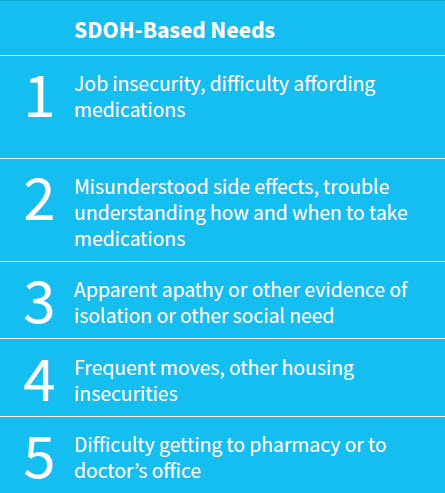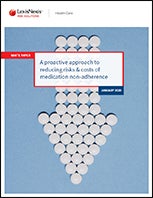Medication Non-Adherence: A Proactive Approach to Reducing Risk
Integrating social determinants of health insights improves overall care management.
Identify At-Risk Patients Using Social Determinants of Health Data to Help Stop Medication Non-Compliance Before It Happens
Daily medication is a fact of life for most Americans. Too many of those patients, however, are not compliant with their medication regimens. Failure to follow doctors' orders has a significant impact on health outcomes and healthcare costs. It’s estimated that medication non-adherence is responsible for almost $300 billion in avoidable healthcare costs annually. There are myriad reasons for patients’ not taking their medications, and many of those reasons stem directly from where and how those patients live and work. In fact, 68% of patients report at least one socioeconomic challenge -- and 57% are considered to be at moderate-to-high risk for financial insecurity, isolation, housing insecurity, transportation trouble, food insecurity or health illiteracy.

When healthcare organizations, like health plans, providers and pharmacies, have the right information to both identify patients with a greater likelihood of medication non-adherence and the possible causes – information that incorporates individuals’ specific potential socioeconomic barriers – those organizations can take a proactive approach to addressing those patients. Utilizing social determinants of health (SDOH) data - information about conditions of everyday life that impact physical and emotional well-being - can help healthcare organizations identify such possible barriers to medication compliance and health management.
Payers, providers and pharmacies that understand the lifestyle attributes that determine most of patients’ overall wellness, and their impact on outcomes and costs, are using SDOH data to develop innovative intervention and care management programs. This would not be possible without clinically-validated SDOH data and the expertise required to know what it means. One of the main goals of care management programs derived from SDOH data is improving medication adherence, using SDOH data to identify at-risk patients and develop interventions in time to help patients prone to compliance lapses. This can stop patients from becoming costly, high-risk cases. Healthcare organizations armed with the right data and analytics capabilities can target care management programs at the specific patients who need them, improving outcomes and helping to keep people healthy.
Understanding Social Determinants of Health Creates New Opportunities in Care Management
Health plans have been especially aggressive about pinpointing patients’ social determinants of health information and using the insights to help align the right resources to address medication adherence. Accustomed to a broader perspective and responsibility for multiple components of the patient experience, payers understand that healthier individual patient populations ultimately lead to more affordable healthcare for everybody. Health plans know how effective targeted interventions related to medication adherence can be in improving those individual patient populations’ health.
to more affordable healthcare for everybody. Health plans know how effective targeted interventions related to medication adherence can be in improving those individual patient populations’ health.
Pharmacists also play an integral role in ensuring adherence to medication protocols. As the healthcare system moves to value-based, accountable care, the integration of pharmacists into the healthcare team is becoming even more essential to improving patient outcomes. Adopting a patient-centered approach to medication use that incorporates barriers to medication-taking leads to better clinical outcomes.
In addition, many providers are already adopting strategies to address patients’ socioeconomic barriers. Doctors can better prescribe medications and treatment plans when they know which patients are more likely to be non-adherent. For example, a care manager for a patient at risk for type 2 diabetes with socioeconomic challenges including food insecurity and transportation troubles could contact the patient to confirm those potential barriers and initiate appropriate interventions. The social determinants of health data gathered also reveals insights about patients’ health behaviors and neighborhood settings, so it can be used to enable conversations about physical activity and healthy eating.
Engage Patients with Customized Programs Built on Solid Socioeconomic Data
Health plans, healthcare providers and pharmacies that have the right socioeconomic information and the know-how to use it to pinpoint possible compliance problems in their patient populations can develop cutting-edge care management programs. To learn more about how social determinants of health data can be integrated into care management planning to improve medication adherence, download our white paper now.
Access White Paper Here


LexisNexis Risk Solutions Addresses Medication Non-compliance through New Predictive Score


